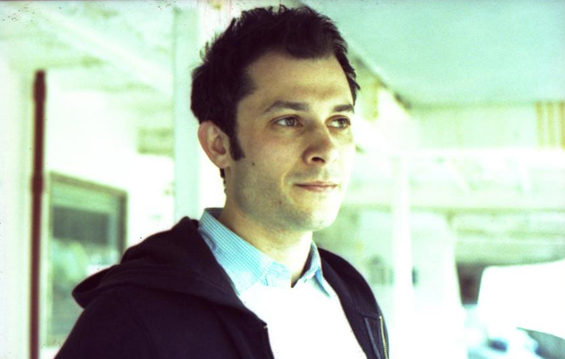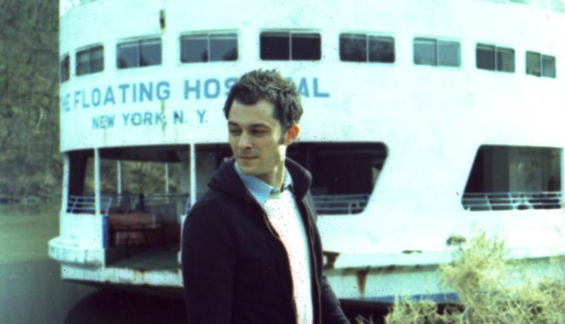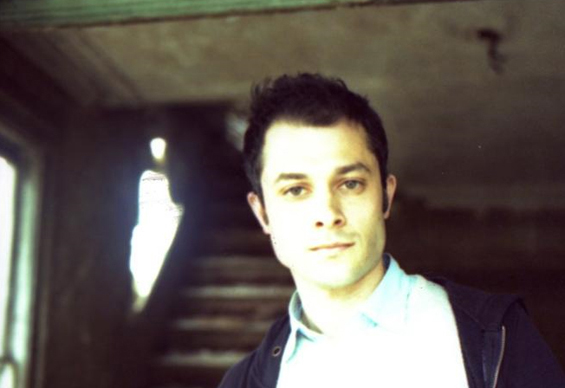

photos: Alex Marvar
TEN QUESTIONS WITH LIAM SINGER
Liam Singer caught our ear in a major way when his second album, Our Secret Lies Beneath The Creek, appeared on our doorstep in fall of 2006, and we've been keeping an eye out for new developments in the Singer universe ever since. Growing up in Portland, Oregon, the precocious teen began recording songs on the accordion, synthesizer, and theremin at the age of fourteen and eventually studied music composition at Kenyon College in Ohio, with harpsichord selected as his main instrument. A move to San Francisco brought about a fortuitous association with Scott Solter and subsequent involvement in The Balustrade Ensemble's Capsules album, and of late Singer's played with Alexander Turnquist, Slow Six, and Boxharp. Of primary note, however, is the release of a superb new full-length called Dislocatia, which finds Singer's voice coming ever more fully into its own. Recently, we had an opportunity to be enlightened further on all things Singer-related by the composer himself.
1. A four-year gap separates Dislocatia and your previous full-length Our Secret Lies Beneath the Creek. Was the new album held up in some way or are you simply the kind of person who prefers to let more time elapse between album releases?
I was definitely hoping to have Dislocatia out sooner. I recorded it with Scott Solter over twelve days in October 2008, and we mixed it a couple months later, so it was basically finished almost two years ago. But I made it with no real idea of what to do with it afterwards... my previous albums had been released by Tell-All records, a label that my friends ran in San Francisco and which had since collapsed, so I had no connections or leads to anyone with whom I might work. It ended up taking me a while to find a label that was both interested in the album and seemed like a good fit. I was very fortunate to hook up with Hidden Shoal, who are totally wonderful and have a real passion for the music they release. Due to their full schedule, however, there was another gap between signing with them at the start of this year and actually getting the album out. As for the two-plus years before I recorded the album, I was moving around the country a lot so it took me a while to get all the songs written, solid, and ready for the studio.
2. How in your eyes does Dislocatia differ from Our Secret Lies Beneath the Creek? Do you see the new one as simply a continuation of the previous one, or are there major differences between them (and, if so, what are they)?
There are definitely similarities between the two albums in their mashing-together of genres, and having instrumental pieces dispersed amongst vocal songs. But I do see Dislocatia as its own entity. I wanted the contrast between the consonant and dissonant musical elements to be more apparent on this album, and for the lyrics to be still personal but less "confessional." I knew early on in writing these songs that they would be more orchestrated, and have more interaction between my voice and others'.
That said, I spend so much time thinking about my music that it's difficult for me to approach it from the standpoint of a listener. I couldn't say what the overall differences are in terms of atmosphere and emotional vibe.
3. Is Dislocatia more accurately a collection of unrelated songs or is it a song cycle (or concept album) based on a specific theme? If it's the latter, could you expand on your intended concept for the album?
In general, I like my albums to have the implied sense of a narrative, even if just on an abstract level. I'll usually write a number of songs without any particular guiding principle. Then I'll look at what themes and ideas emerge when you take them together and try to expand on those. I think if you're working from your own creative impulses, a group of songs will have certain points of cohesion whether you mean them to or not. So I try to take advantage of that, but also not to let thinking get in the way before it needs to.
The word "Disclocatia" implies to me both a landscape (a place that is no place) and a state of being. This refers partly to events that were happening in my life while writing these songs... I had kind of an intense wanderlust for a while, and I moved from San Francisco to spend six months on an island in Maine, followed by three months in Costa Rica, and finally moved to New York. So there was a lot of physical disorientation and connecting/disconnecting with people, starting new jobs and leaving, etc. I also went through the end of a very long relationship, and by the time I made Dislocatia was pretty much in the state that the title implies. But the album is also partly about various metaphysical ideas I was reading and thinking about at the time, for example, Marcia Eliade's sacred versus profane time and the eternal moment, the world of Philip K. Dick's Valis in which we exist in two realities simultaneously, or the writings on Sirius and Discordiansim in Robert Anton Wilson's Cosmic Trigger 1. Furthermore, all this was tied together with my discovery of the music of Morton Feldman, which I found profoundly affecting, and which opened new doors of musical perception for me.
4. To what do you attribute the unique compositional voice that you exemplify in your current work? To what degree can it be connected back to your tenure at Ohio's Kenyon College where harpsichord was your primary instrument?
Studying music academically definitely played a big role in the direction I went, but I think that my most central musical instincts predate college. Learning harpsichord was really just another instance of what has been a lifelong attraction toward neglected sounds. I have always been interested in music that seems fantastic and unusual to me, and in high school I taught myself the accordion and the theremin, and worked with synthesizers for several years. This tendency toward exploring timbres is not so apparent in my two albums previous to Dislocatia, where I was trying to do something more stark and focused, but is starting to emerge again.
Playing the harpsichord did teach me a lot about the Baroque era and approaching music contrapuntally, which still comes through in some of my writing, such as the song "From Fast to Slow / Behind this World."
As a note, it is not actually a harpsichord that appears on Dislocatia, but a tack piano, an upright piano into which we put tacks in the hammers. It's pretty difficult to tell the difference on a recording, though a harpsichord doesn't have a sustain pedal so couldn't have sounded as echo-y as what you hear on the album.
5. Perhaps it's my imagination, but I believe I heard the subtlest trace of Philip Glass surface at one point during the album. Who would you say have been the primary influences on your work?
Well, I'm relieved that it's the "subtlest trace" of Philip Glass you hear, rather than me "ripping him off completely"... the discovery of the minimalists was very big in my life, and though I probably listen to Steve Reich more than any of them, Glass' musical figures played a big role for me when I decided to make the piano my main instrument.
My work at this point is too tangled a jumble of influences for me to name them all, and I feel like each song exists in its own little world. Often I will be inspired by a specific musical idea that I hear, but it will become fairly unrecognizable by the time I'm done with it. There are songs on Dislocatia that were influenced by everything from M83 to Roy Orbison to Moondog, though I don't think you'd really hear any of those artists in my work. There are a handful of bands, most prominently Rachel's, that I'm sure have affected the basic way I've approached the intersection between the various musical worlds I'm interested in.
I also often gain inspiration from reading things by or about artistic heroes of mine. The book of interviews Herzog on Herzog probably influenced Dislocatia as much as anything.

6. While listening to Dislocatia, I was struck not only by how distinctive your composing and arranging styles are but by how theatrical in nature they are too. I can't help but think that you could establish yourself strongly in the world of theatre music composition if you were so inclined (kind of like a modern-day Stephen Sondheim, if you will—and that's meant as a compliment). Do you have any aspirations to participate in that field of artistic endeavour?
I have had several friends comment that they hear traces of musical theater in my work... while that is not an area that I'm consciously influenced by, I can understand why they'd say so. I am attracted to melodrama in music, and there is definitely a level of subdued histrionics in my own. I do like a lot of Opera—old and new—as well as many artists who take an outsized approach to emotional expression, such as Scott Walker, Kate Bush, or Swans. I'm also very influenced by several soundtrack composers, foremost Ennio Morricone and Nino Rota.
So musical theater should ideally provide everything I want, but I guess I find the conventions of most modern musicals sort of cheesy. Not so with many of the past; Stephen Sondheim was an incredible composer and songwriter, as was Leonard Bernstein. And there are other people from that era and earlier on that I really enjoy, like Kurt Weil. I think that if I met the right collaborator, something cool could happen in that realm, but I've never made any effort toward it. I know there is a scene of more non-mainstream musicals happening here in New York—I have friends involved in it—but I just haven't really explored it.
I am generally interested in soundtrack work, and have really enjoyed the little that I've done.
7. If I were asked to name who I would take to be kindred spirits of yours, I'd cite Nico Muhly and Rufus Wainwright, not necessarily on grounds of similarity in musical styles but more for the reason that they're both restless and adventurous plus eager to expand their music into classical and opera realms. Do you see them as kindred spirits or, if not, who do you see in that regard?
It's certainly great praise to be mentioned alongside either artist. I think that Nico Muhly's music is wonderful. He is one of a few really exciting composers here in New York hopping between worlds at the moment. I haven't followed Rufus Wainwright's music as closely, but have always liked what I've heard very much, and get the sense that he doesn't fit neatly into any category. So yes, they're both kindred spirits in the sense that they very much seem to be doing their own thing. I'm not particularly trying to expand into any scene myself; I would of course love to write for classically trained ensembles, but at this point I would have no idea how to make that happen.
I guess I feel an affinity most strongly with artists like Mark Hollis or David Sylvian. Again, there is not much of a direct aesthetic connection between their stuff and mine, but they are both folks who have taken the song form to pretty out places. I write the music that I do because it makes sense to me, but when it's done I'm never quite sure who to hand it to. It often feels too strange for people who want to hear songs, and too normal for an audience that's into experimental stuff. So I get the listeners who are willing to take it for what it is. I feel like a kindred spirit with anybody else in that position.
8. Having Wendy Allen share the vocal duties on the new album strikes me as masterstroke, given how contrasting your voices are. How did Boxharp members Allen and Scott Solter (who produced the album) come to be involved in the album?
Scott and Wendy have been good friends to me. I met Scott in San Francisco when I was looking for someone to record Our Secret Lies Beneath the Creek. It was more or less chance that I found him, but it was a lucky meeting; we ended up sharing a lot in common in regards to musical aesthetics and philosophy, and I was—and continue to be—very inspired by his uncompromising attitude toward life and work. I am lucky to have him as a supporter of what I do. Later, I heard Wendy sing a recital of Appalachian folk songs, and it was clear to me that she has the most beautiful voice in the world. So I was certain that whatever I made next, I wanted Scott to record it and Wendy to sing on it.
9. Did Solter assume a more hands-off role as producer or did he play a significant part in shaping the songs and their arrangements?
I went in fairly prepared arrangement-wise, because I knew that I wanted to accomplish an lot in twelve days. However, I also consciously left space in a lot of pieces for Scott to work. For example, in the piece "Mold Me Torn Fan," I went in knowing that—beyond the basic piano track—I wanted alternating instruments to double the ascending line in the middle of the song, and I wanted a dissonant chord to be held by the children's choir at the end. All of the other sounds were devised in the studio. We ended up mixing this album very quickly, and on my next one I'd like to take more time during that process so that Scott's voice can come through even more.
10. I'm a huge admirer of Slow Six and Alexander Turnquist and the music they respectively produce, so my interest was roused when I learned that you've play keyboards for both artists in live settings. How did those associations come about and what is it like playing in contexts where the artists' musical styles seem at least to be so different from your own?
I have known Alexander for a while now. He first got in touch with me back when I was living in San Francisco and helping to run Tell-All Records; he was a fan of our releases, and wanted to talk about putting something out with us. The label unfortunately disintegrated before that could happen, but we stayed in touch, and began hanging out after we both wound up in the New York area. We've played on several bills together, and I have occasionally provided some simple piano backup at his shows, very basic stuff emphasizing melodic lines coming out of his guitar. He's a great guy, a virtuosic player, and has a wonderful musical ear.
It was through Alexander that I was connected with Chris Tignor and Slow Six. Chris and Alex are friends, and Chris heard me play at a show we were doing together at the now-defunct venue Monkeytown. Slow Six's previous Rhodes player was leaving the city around that time, so afterward Chris contacted me about touring with them, which I did in early June opening up for This Will Destroy You. I have since played a couple other Slow Six shows in the NY area, and have a fantastic time performing with them.
I have played in a fair number of different bands and ensembles, so while Slow Six's music can be challenging in some parts—particularly metrically—I didn't find it a huge leap to start up with them. Though their musical style is very different from mine, we are definitely working from the same worlds of influence.

November 2010![]()